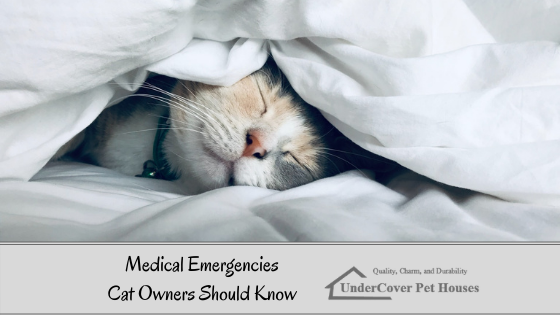 Loading... Please wait...
Loading... Please wait...11 Common Medical Emergencies That Every Cat Owner Should Know
Posted by Danny MacDonald on 2021 May 12th

Medical emergencies occur all the time, but sometimes cat owner can be hesitant and unaware of how grave the situation is. Every cat owner should know how to detect a medical emergency and when to seek immediate vet attention.
Here are 11 of the most common emergencies that always warrant an immediate trip to your vet.
1. Difficulty in Breathing
Breathlessness is a severe life-threatening medical emergency where your cat may experience difficulties in breathing. Symptoms of dyspnea include breathing with the mouth open, coughing, wheezing, irregular respiratory noises, etc. If untreated, breathlessness will eventually lead to death.
2. Seizures
Not all seizure incidents require emergency medical treatment. Often, they're caused by changes in your cat's brain activity, such as during excitement, feeding, or as your cat is falling asleep or waking up.
However, in case of status epilepticus — seizures that last longer than 5-10 minutes, seek emergency treatment immediately. Several illnesses, including brain tumors, infections, viruses, low blood sugar, and parasites, can cause cat seizures.
3. Severe Pain
Depending on their pain threshold, you should notice when your cat is in distress. Symptoms of pain and distress include vocalizing, panting, hiding, and increased sensitivity when you touch a painful area.
Pain can occur suddenly or increase over time, mainly due to illness or injury. Severe pain tends to be more intense and can stop your cat from carrying out normal daily activities. That said, any pain-related issue in cats warrants an immediate veterinary assessment.
4. Sudden Paralysis
Sudden paralysis is an emergency medical condition, as many of its causes are serious. It's characterized by sudden pain and inability to move the limbs. The most common cause of rear leg paralysis in cats is arterial thromboembolism attributed to blood clots in your cat's back legs.
5. Loss of Appetite
Loss of appetite for food or water poses a significant challenge for cat owners, especially when there's plenty of food available to them.
Diseases such as kidney failure, advanced diabetes, intestinal obstruction can stop food intake and cause other major health problems.
Whatever the case, rejecting nutrition is a serious issue that requires instant medical attention.
6. Poison or Toxin Ingestion
It's vital that if you suspect that your cat has ingested toxins or poisons, that you call Animal Poison Control immediately and visit your veterinarian.
Prompt action can determine whether your feline friend survives or succumbs.
7. Lethargy
Cats are known for their liveliness, attention-seeking, and curious nature. So, when you see your cat being lazy, distant, moving weirdly, not responding to stimuli, or hiding from you, something is wrong.
8. Abnormal Urination
If your cat is unable to or experiences difficulties when urinating, they could be suffering from urinary obstruction. This is a severe cat emergency that, if left untreated, is life-threatening. Affected cats often stain and urinate outside the litter box, blood in the urine, and lick their genital areas.
9. Prolonged Vomiting/ Diarrhea
Another cat emergency that requires immediate veterinary treatment is recurrent diarrhea, nausea, and vomiting. If such persists for several days can be life-threatening or be symptomatic of an underlying health condition.
10. Heat Stroke
Heatstroke is an extreme medical emergency. If not treated immediately, it can lead to permanent damage to vital organs or even death. Even if you attend to your cat and they seem to be recovering, they should still always be checked by a vet.
11. Trauma
Cats are sometimes involved in accidents, attacks, or fights with other cats or animals, causing them trauma. Traumatic injuries from open wounds and abscesses to hemorrhages can be life-threatening.
Trauma in cats can either be external or internal, so even cats who appear unharmed may be silently suffering. Visit your vet promptly if you suspect your cat was involved in any traumatic incident.
Endnote
Knowing how to act in common cat emergencies can be a skill that saves your cat's life. While this list is by no means exhaustive, these are arguably the most common medical emergencies every cat parent should be familiar with.
